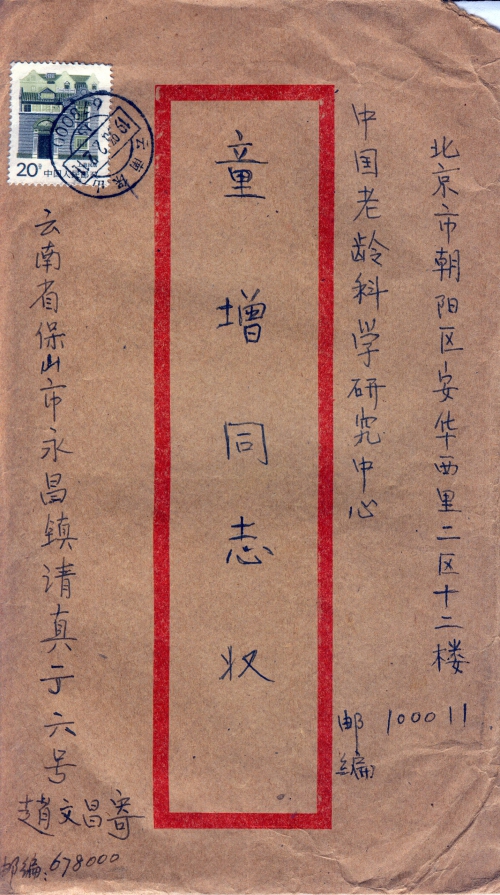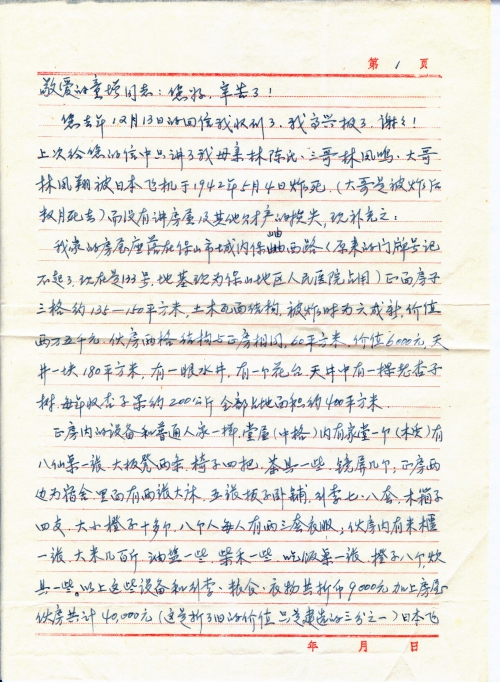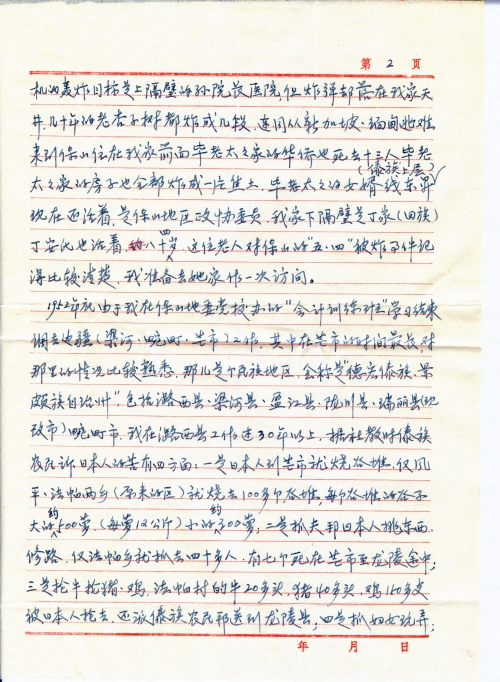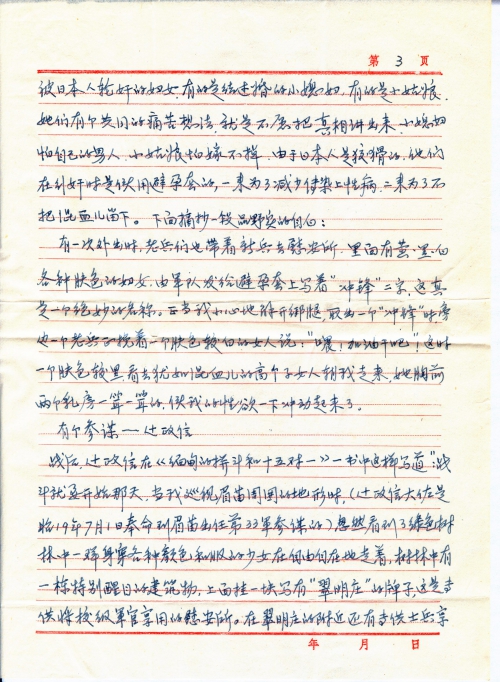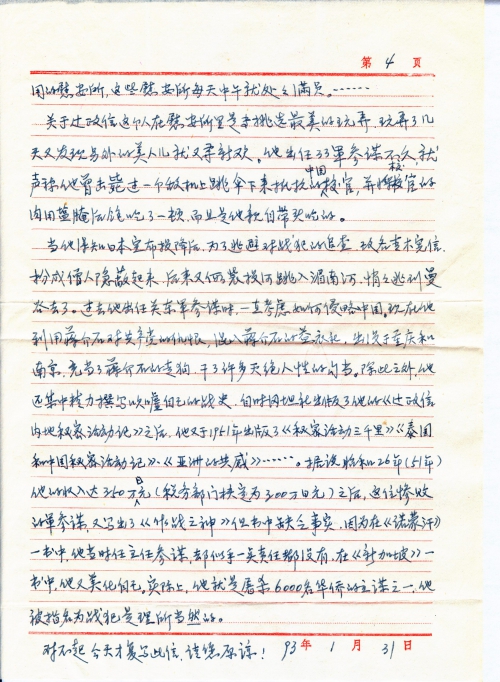Date of letter:1993-01-31
Address of author:Baoshan City, Yunnan Province
Date of event:1942-05-04
Location of event:Baoding City, Hebei Province
Name of author:Zhao Wenchang
Name(s) of victim(s):Zhao Wenchang, etc.
Type of atrocity:Air Bombings, Slave Laborers, Sex Slaves(AB, SL, SS)
Other details:On May 4, 1942, the Japanese bombed Baoding, Hebei Province, when Zhao Wenchang’s three family members were killed, along with a great amount of property damage. Townsmen were conscripted by the Japanese to repair road, some of them died on the way. Many women were raped.
Respectable comrade Tong Zeng:
How’ve you been lately?
Was happy to receive your letter of December 13 last year. Thank you! In my previous letter, I only described that my mother Mrs. Lin, third eldest brother Lin Fengming and eldest brother Lin Fengxiang died in the bombing (my eldest brother died several months later) on May 4, 1942, but I didn’t mention the losses of houses and other properties, which are provided below:
Our house was located at West Baoxiu Road, Baoshan City (I couldn’t remember the original street number. It’s currently No. 133. The ground of my house has been occupied by the People’s Hospital of Baoshan). The main house was made of clay, wood and tiles with an area of about 135-150 square meters. It was 60% new when bombed and was valued at 25,000 yuan. The kitchen was also made of clay, wood and tiles with an area of about 60 square meters, valued at 6,000 yuan. There was a patio of 180 square meters, a well, and a flower bed. There was an old apricot tree in the patio that produced about 200kg of apricots every year. The entire lot of our property was about 400 square meters.
The main house had similar furnishings as those of other ordinary houses. The living room (central room) had an ancestral tablet (wooden), a square table, two large benches, four chairs, some tea sets and several mirrors. On both sides of the living room are bedrooms that had two big beds, five board sleepers, seven or eight pieces of luggage, four wooden boxes, over 10 big and small stools and two or three sets of clothes for each of eight people. The kitchen had a rice cabinet that contained several hundred kilograms of rice, some oil jugs and firewood, a dining table, eight stools and some cookware. The above-mentioned furnishings and luggage, food and clothes are estimated to be 9,000 yuan that is added to the main house and kitchen to a total of 40,000 yuan (This is only the depreciated value; one third of the construction costs). The Japanese planes aimed to bomb our neighbor Dr. Liu’s hospital, but the bomb was dropped into our patio, breaking the decades-old apricot tree into several segments, killing 13 people including overseas Chinese living in Mrs. Bi’s house in front of ours. These people escaped here from Singapore and Myanmar. Mrs. Bi’s house burned down. Mrs.’ Bi’s son-in-law Xian Dongsheng (upper-class member of Dai national) is still alive. He is a CPPCC member of Baoshan. Our neighbor Mrs. Ding (Hui national) living to the south of our house is also alive. She is 84 years old and remembers well the “May 4 Bombing” incident of Baoshan. I am planning to visit her at her house.
At the end of 1952, I completed studying at the Accounting Training Class organized by the Prefectural Party Committee Party School of Baoshan and was transferred to work at the border area (Lianghe, Wanding and Mangshi). I stayed the longest in Mangshi and got to know these areas well. It’s an ethnic area and its full name is Dehong Dai and Jingpo Autonomous Prefecture, which includs Luxi County, Lianghe County, Yingjiang County, Longchuan County, Ruili County (now a city) and Wanding City. I worked at Luxi County, where the Dai farmers talked a lot about the four crimes committed by the Japanese Army. First, soon after they arrived at Mangshi, the Japanese burned down over 100 millet stacks in Fengping Village and Fafu Village alone (former a district). Each millet stack had about 500 luo (1 luo is 12 kg) or 300 luo millet. Second, the Japanese forced the local people to carry stuff and build roads for them. They took away over 40 local people in Fafu Village alone, seven of whom died on the way from Mangshi to Longling. Third, the Japanese robbed Fafu Village of over 20 cattle, over 40 pigs and over 150 chickens and ordered Dai farmers to deliver the livestock to Longling County. Fourth, the Japanese raped women, both married and single women. These women were unwilling to tell the painful truth. The married women were afraid of their husbands and the unmarried women were afraid that no one would marry them. The Japanese were cunning. They used condoms during raping to avoid transmission of sexually transmitted diseases and prevent the women from being pregnant. Below is an excerpt from the confession of Shinano Minoru:
At one time, the old soldiers took new soldiers to a comfort station where there were women of yellow, black and white complexions. The army gave out condoms that read “charge”, which was an excellent word. When I carefully removed the leggings and took out a “charge”, an old soldier holding the hand of a fairly white woman said to me “Hey. Come on and do it!” At that time, a fairly dark, tall seemingly-mixed woman walked towards me, her breasts bumping up and down. I was instantly aroused.
There was a tactician named Masanobu Tsuji.
After the war, Masanobu Tsuji wrote in the book Myanmar Battle and Fifteen Versus One that, “A battle was about to come. When I was inspecting the terrain of Meimiao (Masanobu Tsuji was ordered to serve the No. 33 Army as a tactician on July 1, 1944), I suddenly saw young women in kimonos of different colors walking freely among green woods. There was a particularly striking building in the woods with a plate reading “Jade Garden”. That was a comfort station especially for higher-level officers. There was another comfort station for soldiers near Jade Garden. These comfort stations were crowded at noon every day…”
It was said that Masanobu Tsuji always picked the most beautiful woman in the comfort station to play for several days and would then change to a new one. Not long after he served as a tactician of the No.33 Army, he claimed that he killed a Chinese officer who parachuted from a plane and salted his flesh, and was the first one to eat it.
After he was knew about Japan’s surrender, he changed his name to Aoki Kenshin, disguised himself as a monk to avoid being investigated for war crimes. Later, he jumped into the Chao Phraya River and quietly escaped to Bangkok. When he was a tactical staff of the Kwangtung Army, he devised plans to invade China. Now he took advantage of Chiang Kai Shek’s hatred of the Communist Party and became a lackey of Chiang’s secret organization the “Blue Coat Society” and appeared in Chongqing and Nanjing. In tat capacity, he committed more inhumane crimes. Moreover, he put his energies on writing books to brag about his war experience. After publishing “Clandestine Operations in the Mainland”, he also published “3,000 Miles Underground”, “Clandestine Operations in Thailand and China” and “Asia’s Common Sense” in 1951. It is said that his revenue reached 500,000 yen (3,000,000 yen claimed by the tax department) in the 26th year of the Showa period (1951). Later, this defeated tactician further wrote “The Mastermind Behind Japan’s Greatest Victory” which lacked facts. In his book “Paramont Khan”, it seemed that he was not responsible for the defeat but he was then the primary tactician. And he beautified himself in the book “Singapore”. But in fact, he is one of the main conspirators to massacre 6,000 overseas Chinese. He was rightly named as a war criminal.
Sorry I didn’t reply your letter until today.
January 31, 1993














